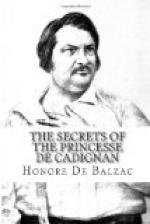This was the last drop; poor d’Arthez could bear no more. He fell upon his knees, and laid his head on Diane’s hand, weeping soft tears such as the angels shed,—if angels weep. As Daniel was in that bent posture, Madame de Cadignan could safely let a malicious smile of triumph flicker on her lips, a smile such as the monkeys wear after playing a sly trick—if monkeys smile.
“Ah! I have him,” thought she; and, indeed, she had him fast.
“But you are—” he said, raising his fine head and looking at her with eyes of love.
“Virgin and martyr,” she replied, smiling at the commonness of that hackneyed expression, but giving it a freshness of meaning by her smile, so full of painful gayety. “If I laugh,” she continued, “it is that I am thinking of that princess whom the world thinks it knows, that Duchesse de Maufrigneuse to whom it gives as lovers de Marsay, that infamous de Trailles (a political cutthroat), and that little fool of a d’Esgrignon, and Rastignac, Rubempre, ambassadors, ministers, Russian generals, heaven knows who! all Europe! They have gossiped about that album which I ordered made, believing that those who admired me were my friends. Ah! it is frightful! I wonder that I allow a man at my feet! Despise them all, that should be my religion.”
She rose and went to the window with a gait and bearing magnificent in motifs.
D’Arthez remained on the low seat to which he had returned not daring to follow the princess; but he looked at her; he heard her blowing her nose. Was there ever a princess who blew her nose? but Diane attempted the impossible to convey an idea of her sensibility. D’Arthez believed his angel was in tears; he rushed to her side, took her round the waist, and pressed her to his heart.
“No, no, leave me!” she murmured in a feeble voice. “I have too many doubts to be good for anything. To reconcile me with life is a task beyond the powers of any man.”
“Diane! I will love you for your whole lost life.”
“No; don’t speak to me thus,” she answered. “At this moment I tremble, I am ashamed as though I had committed the greatest sins.”
She was now entirely restored to the innocence of little girls, and yet her bearing was august, grand, noble as that of a queen. It is impossible to describe the effect of these manoeuvres, so clever that they acted like the purest truth on a soul as fresh and honest as that of d’Arthez. The great author remained dumb with admiration, passive beside her in the recess of that window awaiting a word, while the princess awaited a kiss; but she was far too sacred to him for that. Feeling cold, the princess returned to her easy-chair; her feet were frozen.
“It will take a long time,” she said to herself, looking at Daniel’s noble brow and head.
“Is this a woman?” thought that profound observer of human nature. “How ought I to treat her?”




